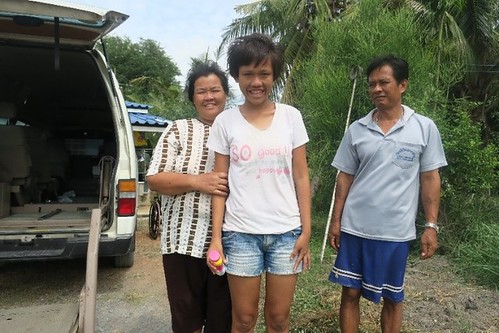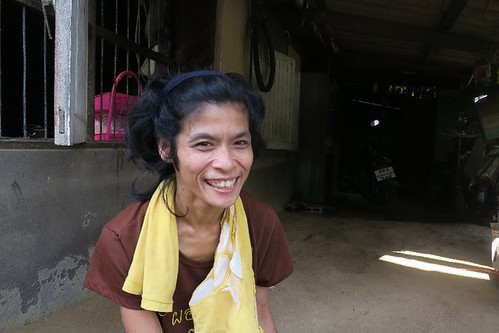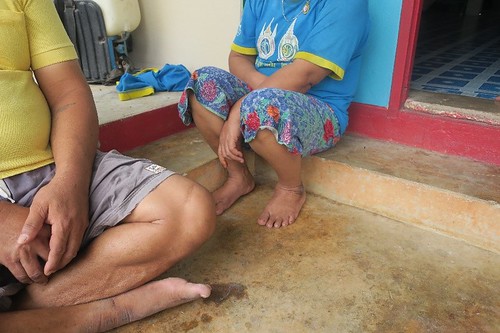Why is it hard for us to imagine what the sex lives of disabled people are like? Will they have children? Have they ever had boyfriends or girlfriends? This may reflect the old saying that “sex” and “disability” are completely separate from each other. Many disabled people have never received sex education; some are kept away from it; some are afraid because they don’t know anything. The result is that many of the disabled and their families choose to bury this topic away as deep as possible, with many avoiding the problem altogether through sterilization.
How serious is sterilization? Many disabled women have been sterilized without them being aware of it and many have had it done because of one-sided information. Many others have had it done because their families persuaded them. Many who may want to become mothers after they had been sterilized, then find that it was widely recommended that young disabled women should be sterilized. Many women have been sterilized soon their periods start, because it is thought that sterilization will prevent these women from producing further disabled offspring.
Still, sterilization does not prevent sexual abuse, as is widely believed. In fact, it may even lead to sexual repeated abuse that no one knows about even though in reality, abuse is an offence which should never occur in the first place.
Some disabled people choose to live by themselves, but still must remain alert for fear of sexual abuse like the news they see on TV.
I crisscrossed all over Nakhon Pathom for many days in the belief that everyone is equal and everyone has rights over their own body. I travelled through the bustling city and into the quiet calm of Bang Len, Khlong Yong, and Bang Rakam to investigate and understand the perspective and mood of humanity that hasn’t been divided by disability.
These places helped dispel the popular questions: “Why does someone disabled need to get pregnant?” and “If you’re disabled, how can you raise a child?” among others.
“Dejection”
It’s late afternoon on a working day. I travel along a winding road alone, through Nakhon Pathom city aiming for Bang Len District. Most of the surrounding area there is forest, and once in a long while I’ll see a house or two. Nusra Num-euam’s house, my destination, is in the middle of rice fields. Short grass covers the area with a bright green. The red earth road is cracked because of the stifling heat. We sit and talk on the stone bench by her house. There are traces of a fish pond and pigpen, which have both been the household’s basic livelihood.
Twenty years ago, the hearts Nusra’s parents were bursting at the birth of their healthy baby boy into their financially stable household. Not long after their joy they found something unusual when their son didn’t make eye contact, didn’t walk, didn’t talk, and didn’t respond to any stimuli. But even so, the doctors told the couple to try for another child in the hope that the second child would not have any disability and could support their parents and elder brother.

Nusra Num-euam and her family
Nusra, the daughter that was expected, is now 24. She lives with her diabetic parents and a mentally disabled older brother. She has learning disabilities and can speak slowly with a few, short words. Phraiwan Num-euam, her mother, tells Prachatai that her son and daughter are different. Her son is cannot help himself at all and cannot even feed himself, and spends the day sitting and staring into space or moving himself by crawling. However, her daughter is slow but able to study at school. If Nusra had not had seizures at age nine, then she would have become childlike as she is today.
“When I found out my first child was disabled, I told the doctor to sterilize me. I didn’t want another disabled child. But the doctor told me he couldn’t, and to have another child who might be able to take care of me in my old age. But she’s disabled too. If I knew it would be like this, I would better have had myself sterilized myself at the beginning,” said the mother.
Nusra is able to speak a little to communicate. She is a young woman who loves to look good, dress up, put on makeup, and collect bags and shoes. Often she changes her outfit several times a day, trying things on and mixing and matching pieces. Sometimes, she changes her clothes where people can see. This really worries her parents, who are afraid of both gossip from the neighbours and worst of all that their daughter will be sexually abuse out of her own naivety.
“As a mother, I’m often dejected. But she’s been born, so we have to take care of her. I wanted one child to be good, but none of them are. I can’t go anywhere because I can’t leave her home alone. Nusra the lady loves to go naked and change her clothes. This problem has happened. All we can do is to make the houses around be good to her.”
“Someone once asked me, how can you handle having a child like this, who takes off her clothes and goes naked? I worried about it a lot. There was no option. I took my child to get sterilized in Nakhon Pathom. I was sorry, but what could I do? We don’t have any idea about how to take care of her ourselves,” said the mother.
Because of Nusra’s childlike level of maturity, she is unaware that what she does puts her at risk of sexual abuse. She often begs her mother and anyone passing by her house to buy her things, resulting in her once being sexually abused. Her mother told us in tears that she didn’t want to talk about that incident because thinking back about it reopens painful wounds.
Nusra was sterilized in 2005, when she was 13. Nusra herself is unaware that she was sterilized, because it was an agreement between the doctor and her mother.
“Someone once asked me, how can you handle having a child like this, who takes off her clothes and goes naked? I worried about it a lot. There was no option. I took my child to get sterilized in Nakhon Pathom. I was sorry, but what could I do? We don’t have any idea about how to take care of her ourselves.”
“The doctor talked to me. He said he did not recommend other methods of birth control. He said we should do this in case, after we are gone, someone bad comes to harm her, which did happen before and we even brought it to court. Sometimes, Nusra even goes crazy and grabs knives and things. Sometimes she sees me crying and tells me not to cry, she loves me. Sometimes she sits and cries,” said Phraiwan.
When the burden of raising two disabled children gets to be too much, the parents often argue. The father talks of “leaving” all the time because of the pressure, so sometimes the mother can’t help thinking that a shelter would help be a better place for them to re-establish their lives. In fact, getting into a shelter isn’t as easy as many people understand, especially if you cannot sending money every month payments. It’s even much harder for when Nusra is not used to living apart from her parents.
“My husband said he will leave. I told him, ‘If you leave, tell me first, so I can sort myself out properly.’ But he doesn’t have to tell me where he’s going or what he’s going to do. If he leaves, I’ll hang myself. Problem solved.”
“I’ve told the old people that if I die and my children are still alive, I’ll hand over my children and my land to the Public Welfare. They can do whatever they want with them. They don’t have to pray over my bones, just cremate me into dust so I won’t be a burden to anyone. I’m just worried about what in the future these two are going to eat. I thought about borrowing but there’s no way I can pay it back. We’re barely surviving now. It’s not easy taking care of these two because I can’t go to work, I have to stay at home and watch them. I’m stressed. I want to go outside the house to work and go out with friends and have some good fun in society,” said the mother.
Soon after we started talking, Nusra woke up and walked out of the house. She looks more like a child than she really is, with her short hair and thin body. She can only talk in short words, but understands questions. When her mother asked, “Nusra, do you love mommy?” Nusra quickly nodded her head. When her mother suggested Nusra wanted to go live at the shelter with me, the girl answered “Go, go, don’t cry.”
“Fear”
“I’m scared. I see a lot of news about disabled people being sexually abused. Going in or out of the room I double-lock the door, put on the bolt and fasten another one. I’m scared but there’s nothing I can do. I have to go out and sell, and I come home in the middle of the night almost every day,” said Orani Mongkhonphan.
Orani, a woman of 35, shares her concerns when she has to live in a rented room alone after leaving the welfare home. She has cerebral palsy or CP, which causes the muscles all over her body to stiffen. Apart from the effect of this illness on moving her limbs, but the muscles in her face are also affected. Orani is able to communicate in short sentences like a person with a stammer and relies on crawling along the floor to get around.
Although this all sounds overwhelming, Orani is able to do all of her daily chores such as cooking, showering, cleaning, dressing, and dexterously preparing the board of lottery tickets to sell at the Tesco Lotus near her house.

The area in front of Orani’s rented room
Orani tells me that ever since she can remember, her grandparents were the ones who raised her. When they passed away when she was 14, her world was turned upside-down. The welfare home became her second home and even though she was entering adolescence at the time, the welfare home had nothing at all to say about sex or looking after yourself.
“There was no sex education, only a ‘no sexual intercourse’ rule. Kids would find out from outside sources. Some looked in the school books. There was often a problem of sexual abuse there, such as ‘someone with a good head’ raping ‘someone with a bad head’ [Orani used these terms to refer to people with and without mental disabilities], raping the deaf, or the deaf raping the mentally disabled. Part of this stems from not having enough staff,” Orani said.
However, as far as she knows, this home did not force or recommend that students get sterilized because it was unethical. Still, she did know of some mentally disabled children who were sterilized in order to prevent pregnancies if they were sexually abused, and injecting contraceptives into people who were disabled in other ways.
“I’m scared. I see a lot of news about disabled people being sexually abused. Going in or out of the room I double-lock the door, put on the bolt and fasten another one. I’m scared but there’s nothing I can do. I have to go out and sell, and I come home in the middle of the night almost every day.”
When she was around 14 or 15, Orani started having sexual urges and constant questions and doubts about sex occurred even in the welfare home. But from feelings of embarrassment about asking the welfare home staff these questions, so many children just kept their doubts to themselves. This was lucky for the staff, because they themselves didn’t have enough knowledge or understanding to give answers or advice about sex education and advice to the disabled.
Looking from the outside, we might think that the welfare home is a place full of rules and uniforms. But in fact, what is secretly hidden is a view on relations and needs that have never properly come together. Orani says that many students at the shelter hope to have a proper family outside the gates of the home. Same-sex couples can be seen here and there and heterosexual couples conceal their relationship, since all activities in the home are divided by sex. Therefore, while this kind of thing can be seen in many places, the staff at the welfare home have never given even a little information about sex and relationships for the disabled.
“When they reach 18, the kids would be sent out of the welfare home. Some were picked up by their guardians, others were sent to other homes, and there is a large number who choose to leave and live alone, like me. Life outside is quite hard. I always have to be careful. I sell lottery tickets at the nearby Lotus from noon until 8 pm every day. Once, a 10-wheeler scraped against my wheelchair and sent it spinning in mid-air. Still, I have to keep fighting because there’s not many other options,” Orani said.
These days, Orani takes good care of herself, and is always watchful of her surroundings. She sends money back home regularly. Although she is not thinking about romance at this time, she doesn’t close herself off, and has good social relations.
“The Wait”
Thitima Liangraksa, 42, is disabled with cerebral palsy like Orani. Thitima has three siblings, and a younger sister with mental disability. She lives in a small, one-storey house surrounded by concrete, stone, and gravel that Thitima always has to crawl across in order to get in and out of her house. As a result, her knees are scratched and cut. Books and school are something she almost doesn’t know about. Her parents go out to work, leaving her and her mentally disabled sister alone every day with only the radio for company.
Thitima was sexually abused together with her sister while at home alone. Although they know who abused them, they could not prosecute him because there was no evidence and Thitima is unable to communicate so that others can understand very much due to her disability, which makes her facial muscles so stiff that she cannot speak clearly. Both she and her sister got pregnant from the rape and gave birth to healthy daughters, who are now 19 years old.
On the day of the delivery, the obstetrician sterilized Thitima and her sister without informing them or asking for the prior consent of Thitima or their family.
Generally, sterilization needs the consent of the patient, according to Article 3 of the declaration of rights of the Medical Council, which states the right of the patient to be clear and complete information from medical professionals so that they can choose to voluntarily give or not give their consent for an operation. The only exceptions are emergencies or cases where the operation is necessary but the patients cannot make a decision and relatives or guardians can make the decision for them. Nevertheless, Thitima’s condition does not impair her conscious ability to make decisions. Her brain is normal, it is just that her speech is not clear and leads many people to assume she has a mental condition. Therefore, it may be thought that the sterilization exceeded medical responsibility, because Thitima and her family were not even informed about the procedure.
While Thitima was pregnant, it was not kept a secret. But she never went to the maternity hospital or had a check-up. The only relevant thing she had were blood tonics her relatives got from Phutthamonthon Hospital. Thitima didn’t know the sex of her child until birth. Thitima’s first question was “Girl or boy?” and she heard the answer “Girl.”
As a new mother, Thitima was never taught about “motherhood.” No one told her how to hold her baby. No one told her how to breastfeed and she was not allowed to see or hold her baby after she was born. She hasn’t even ever held her own child because immediately after the birth, her child was taken away and sent to be raised by another younger sister.
What happened to Thitima illustrates well how the Thai public health system treats the disabled. Generally, when an abled woman gives birth, the midwife has the job of giving advice and teaching skills about childcare to all new mothers, which might include advice about having more children or any possible risks. One factor that made the doctors choose not to communicate with was that they thought Thitima was mentally disabled because her speech was slow, unclear and halting. In fact, Thitima only has a disability with moving.
From her story, many readers may think Thitima now is living a fretful existence because of what happened to her. Although it is certain that her past cannot be changed, Thitima today has become a strong mother and a beloved grandmother to a 3-year-old granddaughter.

Thitima Liangruksa
“When Mother’s Day comes, I don’t go anywhere. I wait at home for my daughter and granddaughter,” she said. “She’s cute, has long hair, is talkative, and is very smart,” Thitima said over and over. She talks over and over when it’s about the feelings she has towards her granddaughter, with smiles with happiness shining from her eyes.
Thitima only has a few daily chores due to her physical limitations: eat, sleep, and go to the bathroom. One thing she does well, which everyone in the family says she’s the best at, is mopping the floor meticulously. She spends almost the whole day sweeping and mopping the floor while happily listening to luk thung (country) music on the radio.
She has two favourite singers: Jintara Poonlarp and Jaloi Henry. Jintara’s hit, “Asking My Friend to Write a Letter,” is her favourite song. Here are some of the lyrics.
“Lying thinking of him, but I’ve got no chance
So I picked up a piece of paper to write a letter
But I don’t know how to write, what will I do?
Asking friends to write it for me, I’m so embarrassed”
“Books, I’ve never read them since I was born
Shameful life, unbearably far from home
My unlucky parents have nothing, struggling to survive
Because of poverty, I didn’t go to school”
“The lyrics are just like my life. I listen to it and think of my own life,” Thitima said.
“Insanity”
Inside the fence of a house shaded by trees that stretch from the entrance, a mother duck and her ducklings are running around playfully next to a big pond to the side of a large house and a blue, one-storey house, where Phloen (not her real name) lives with her mentally and visually disabled brother.
Phloen, a middle-aged woman with the manner of a child has eight siblings in all, with four of the eight, including Phloen, having various disabilities in sight, hearing, and mental ability. The doctors cannot determine for sure what the condition is. Phloen’s disabilities have always been called a “hereditary disease.”

Phloen and her brother
Nowadays, Phloen can see very little because of glaucoma. Compared with three years ago when she could still see fuzzy shapes, her sight has gradually deteriorated as a side effect of her diabetes and sedatives. She can take care of herself to some level, but cannot work or communicate with those around her. She is focused on the things she is interested in, and uses touch to identify people. Phloen uses a special language of “ers” and “ahs” that she uses only with her brother.
Saithong Natsuwong, her younger sister, said that Phloen was raped almost 20 years ago by their younger brother. At that time, no one knew she had been sexually abused until one night when Phloen started crying and throwing an extraordinarily heavy tantrum. Saithong saw a baby’s leg sticking out of Phloen’s sarong. Although they rushed to the hospital, the distance was too far and most of the baby was delivered in the back of a truck with just the chin stuck at the entrance to Phloen’s vagina. In the end a baby girl was born at the hospital.
“I pity her because she’s disabled and can’t talk or communicate. She was probably in a lot of pain so she threw a tantrum. She knew that the person who raped her was her brother, but she couldn’t do anything because he did it because he couldn’t control himself. Phloen uses injectable contraceptives, and will stop soon since she is nearing 50.
“I don’t think she knows she had a baby, since her mind isn’t sound. Especially at that period, she threw a lot of tantrums. If she didn’t take sedatives, she would have shown signs of being scared of her rapist. I don’t know who to blame. It’s something we can’t talk about, because the person who did it is within the family,” Saithong said.
Phloen’s daughter is disabled, like her. Phloen has never held or even been close to her child like other mothers, because the doctors do not believe she can take care of a child. So the whole burden of raising the child fell to Saithong who had to work twice as hard to support her older sister and niece, who can walk and eat on her own, but cannot take care of herself or communicate. In 2011, when she was 13, the niece drowned in the big pond by the house.
“I pity her because she’s disabled and can’t talk or communicate. She was probably in a lot of pain so she threw a tantrum. She knew that the person who raped her was her brother, but she couldn’t do anything because he did it because he couldn’t control himself. Phloen uses injectable contraceptives, and will stop soon since she is nearing 50.
“I felt connected to my niece because I took care of her since she was little. Once I sent her to a home for disabled children, but I couldn’t bear to see her bullied by the other kids. They smacked her and bit her ear and her face was all bruised because she couldn’t communicate. When my niece drowned, I was sad but couldn’t do anything. She was probably in a lot of torment, struggling in the water but couldn’t get out. Her muscles were weak,” said Saithong.
In Phloen’s case, she never received advice from doctors about sterilization nor did she enter the public health system, even when pregnant, since Phloen’s family is poor and lives far from the hospital in the city. When Phloen still had her periods, she could take care of herself. She used a twisted loincloth as a sanitary napkin without anyone having to teach her. This is a clear example that shows that Phloen’s disability did not diminish her ability to learn about sex, as many believe. Suitable sex education adapted for disabled people might have helped Phloen to learn about being a “mother” and helped to give her better protection in sex matters.
The article was first published in Thai in Prachatai and translated into English by Asaree Thaitrakulpanich.

